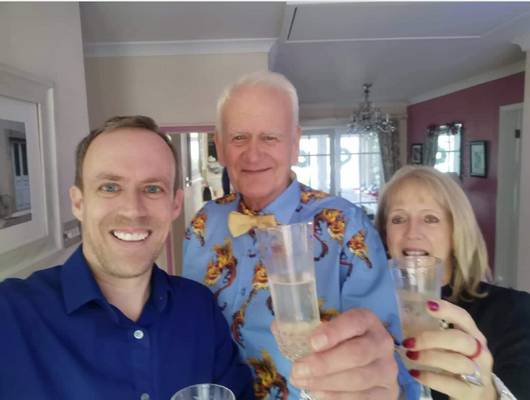- A+
所属分类:英语资料

:

英语条件句有时被称为“if 从句”,分为真实条件句和非真实条件句,它们描述了可能发生(现在或将来)或可能发生但没有发生(过去)的事情的结果,由不同的时态组成,主要有四种条件句:零条件句、第一类条件句、第二类条件句和第三类条件句。
一、零条件句(conditional 0/present real conditional)
1. 格式:if/when + … 一般现在时…,…一般现在时…
2. 用法:当结果总是发生时或绝对真理时使用零条件句,属于真实条件句,比如如果水达到100度,它总是沸腾,例如:
if water reaches 100 degrees, it boils.
如果水达到100度,就会沸腾。
if people eat , they get fat.
如果人们吃得太多,就会发胖。
if you touch a fire, you get burned.
如果你碰了火,你就会被烧伤。
people die if they don't eat.
人不吃就会死。
you get water if you mix hydrogen and oxygen.
如果你把氢和氧混合,你就会得到水。
snakes bite if they are scared.
蛇收到惊吓就咬人。
if babies are hungry, they cry.
如果婴儿饿了,他们会哭。
if i eat peanuts, i am sick.
如果我吃花生,我就生病。
解析:这只对我来说是真的,也许不是对每个人都是这样,但每次吃花生我都会生病,因此也属于零条件句。
if the weather is nice, she walks to work.
如果天气好,她就步行去上班。
解析:这只对她来说是真的,也许不是对每个人都是这样,但每次天气好,她就会步行去上班,因此也属于零条件句。
jerry helps me with my homework when he has .
杰瑞有时间时帮我做作业。
解析:这只对 jerry 来说是真的,也许不是对每个人都是这样,但每当 jerry 有时间时,他就会帮我做作业,因此也属于零条件句。
i read if there is nothing on tv.
如果电视上什么都没有,我就看书。
解析:这只对我来说是真的,也许不是对每个人都是这样,但每当电视上没什么我想看的节目时,我就看书,因此也属于零条件句。
3. if 和 when
if 和 when 都可以用于零条件句中,但是 if 表示某事发生的频率较低,而 when 表示某事有规律地发生,例如:
when i have a day off from work, i go to the beach.
当我下班休息一天时,我通常去海滩。
解析:此句表示我有规律地请假。
if i have a day off from work, i usually go to the beach.
如果我有一天的假,我通常去海滩。
解析:此句表示我很少有休息日。
二、第一类条件句(conditional 1/future real conditional)
1. 格式:if/when + …一般现在时…,... 一般将来时…
2. 用法:当用来描述你认为将来可能发生的事情时使用第一类条件句,它也属于真实条件句,因为虽然我们不知道将来会发生什么,但是将来还是有可能会发生,例如:
if it rains, i won't go to the park.
如果下雨,我就不去公园。
if i study today, i'll go to the party tonight.
如果我今天学习,我今晚就去参加晚会。
if i have enough money, i'll buy new shoes.
如果我有足够的钱,我会买一些新鞋。
she'll be late if the train is .
如果火车晚点,她会迟到的。
she'll miss the bus if she doesn't leave soon.
如果她不马上离开,她会赶不上公共汽车的。
if i see her, i'll tell her.
如果我见到她,我会告诉她。
3. if 和 when
if 表示你不知道某事是否会发生,而 when 表示某件事一定会在某个时刻发生,我们只是在等待它的发生,例如:
when you call me, i will give you the address.
当你打电话给我时,我会给你地址。
解析:你稍后会打电话给我,到时候,我会把地址给你。
if you call me, i will give you the address.
如果你打电话给我,我会告诉你地址。
解析:如果你想知道地址,可以打电话给我。
三、第二类条件句(conditional 2/present unreal conditional)
1. 格式:if + …一般过去时…,… would + 不带 to 不定式… | … would + 不带 to 不定式…,if + …一般过去时…
2. 用法
a. 用来表示与将来事实可能相反的事情,比如在幻想什么东西,例如:
if i won the lottery, i would buy a big house.
如果我中了彩票,我会买一幢大房子。
if i met the queen of england, i would say hello.
如果我遇到英国女王,我会向她问好。
she would travel all over the world if she were rich.
如果她有钱,她会周游世界。
she would pass the exam if she ever studied.
如果她学习的话,她会通过考试的。
b. 用来表示现在不可能的事情或情况,因为不是真的,例如:
if i had his number, i would call him.
如果我有他的电话号码,我会打给他。
解析:我现在没有他的电话号码,描述的不是真的情况。
if i were you, i wouldn't go out with that man.
如果我是你,我就不会和那个男人约会。
解析:我不可能是你,描述的不是真的情况。
3. 在第二类条件句中,虽然 was 经常出现在对话中,但是在语法上它是不正确的,在英语写作或考试中要用 were,例如:
if he were french, he would live in paris.
如果他是法国人,他会住在巴黎。
if she were rich, she would buy a yacht.
如果她有钱,她会买一艘游艇。
i would play basketball if i were taller.
如果我再高一点,我就会打篮球。
i would buy that computer if it were cheaper.
如果那台电脑便宜的话,我会买的。
4. if 和 when:只有 if 可以用于第二类条件句,而 when 不可以。
5. 情态动词例外
if i went to egypt, i could learn arabic.
如果我去埃及,我就可以学阿拉伯语。
if he invited you, you really should go.
如果他邀请你,你真的应该去。
if she had time, she might go to the party.
如果她有时间,她可能会去参加聚会。
四、第三类条件句(conditional 3/past unreal conditional/imagined conditions)
1. 格式:if + …过去完成时…,… would(could/should/might)+ have + 过去分词
2. 用法:用来谈论过去,描述一个没有发生的情况,并想象这种情况的结果,例如:
if she had studied, she would have passed the exam.
如果她学习的话,她就会通过考试了。
if i hadn't eaten so much, i wouldn't have felt sick.
如果我没有吃那么多,我就不会觉得恶心了。
if we had taken a taxi, we wouldn't have missed the plane.
如果我们乘出租车,就不会误了飞机。
she wouldn't have been tired if she had gone to bed earlier.
她要是早点睡觉就不会累了。
she would have become a teacher if she had gone to university.
如果她上大学,她就会成为一名教师。
3. if 和 when:只有 if 可以用于第三类条件句,而 when 不可以。
4. 情态动词例外
if i had gone to egypt, i could have learned arabic.
如果我去了埃及,我就学会阿拉伯语了。
if she had had time, she might have gone to the party.
如果她有时间的话,她可能已经去参加聚会了。
if i had had more time, i could have exercised after work.
如果我有更多的时间,我就可以在下班后锻炼。
if he had invited you, you might have gone.
如果他邀请你,你可能已经去了。
五、混合型条件句(错综时间条件句 mixed conditionals)
1. 定义:指同一个句子中包含两种不同的时态,分别用来谈论不同时间所发生的事情,通常由表示事与愿违的虚拟条件句(第三类条件句)和表现在或未来情况的虚拟条件句(第二类条件句)的相应成分组成。
2. 分类
a. 过去<->现在
if i hadn’t missed my bus, i would be in france now.
如果我没有错过公共汽车,我现在就在法国了。
if i had slept longer, i wouldn’t be tired now.
如果我睡久一点,我现在就不会累了。
if she had tried harder, she would be more successful now.
如果她再努力些,她现在会更成功。
if i had saved more money i would own this house.
如果我多存点钱,我就会拥有这所房子。
b. 过去<->将来
if she had signed up for the ski trip last week, she would be joining us tomorrow.
如果她上周报名参加滑雪旅行的话,她明天就会加入我们的行列。
if mark had gotten the job joe, he would be moving to shanghai.
如果马克代替乔得到了这份工作,他就要搬到上海去了。
if i had been hired, i would be moving to england next week.
如果我被录用的话,我下周就要搬到英国去了。
if she had signed up for the ski trip last week, she would be joining us tomorrow.
如果她上周报名参加滑雪旅行的话,她明天就会加入我们的行列。
c. 现在<->过去
if i had more money, i would have gone to france.
如果我有更多的钱,我就去法国了。
if i were rich, i would have bought that ferrari we saw yesterday.
如果我有钱的话,我会买我们昨天看到的那辆法拉利。
if i drank coffee, i would have ordered a cup.
如果我喝咖啡,我就会点一杯。
d. 现在<->将来
if i didn't have so much vacation time, i wouldn't go with you on the cruise to alaska next week.
如果我没有那么多的假期,我下周就不会和你一起去阿拉斯加了。
if cindy were more creative, the company would send her to new york to work on the new campaign.
如果辛迪更有创意的话,公司会派她去纽约为新的广告活动工作。
if dan weren't so nice, he wouldn't be tutoring you in math tonight.
如果丹不是那么好,他今晚就不会教你数学了。
e. 将来<->过去
if i weren’t going on my trip next week, i would have accepted that new assignment.
如果我下周不去旅行的话,我会接受那项新任务的。
if my parents weren’t coming this weekend, i would have planned a party.
如果我父母这个周末不来的话,我会计划一个聚会的。
if his sister weren’t visiting this weekend, he would have come with us.
如果他妹妹这个周末不来,他就会和我们一起来了。
f. 将来<->现在
if i were going to that concert tonight, i would be very excited.
如果我今晚去听音乐会,我会很兴奋的。
if sandy were giving a speech tomorrow, she would be very nervous.
如果桑迪明天要发表演讲,她会很紧张的。
if seb didn't come with us to the , everyone would be very disappointed.
如果塞布没有和我们一起去沙漠,每个人都会非常失望。
六、条件句之间的区别
1. 零条件句和第一类条件句:第一个条件描述了一个特定的情况,而零条件描述了一般的情况,例如:
if you sit in the sun, you get burned.
如果你坐在阳光下,你会被烧伤。
解析:此句是零条件句,指的是每当一个人坐在阳光下时,烧伤是坐着的自然结果。
if you sit in the sun, you'll get burned.
如果你坐在阳光下,你会被烧伤的
解析:此句是第一类条件句,指的是今天会发生什么,但另一天可能会不同。
2. 第一类条件句和第二类条件句:第一个条件句描述的是我认为将来可能发生的事情,而第二个条件描述的是我认为不会真正发生的事情(不可能发生或发生的可能性很小),例如:
if she studies harder, she'll pass the exam.
如果她学习更努力,她会通过考试的。
解析:此句是第一类条件句,指的是我认为她有可能会更加努力学习,所以她会及格的。
if she studied harder, she would pass the exam.
如果她努力学习,她会通过考试的。
解析:此句是第二类条件句,指的是我觉得她不会再努力学习了,或可能性很小,所以她不会及格。
if i have enough money, i'll buy new shoes.
如果我有足够的钱,我会买一些新鞋。
解析:此句是第一类条件句,指的是我认为我更有可能有足够的钱买鞋子。
if i had enough money i would buy a house with twenty bedrooms and a swimming pool.
如果我有足够的钱,我会买一栋有二十间卧室和一个游泳池的房子。
解析:此句是第二类条件句,指的是我可能不会有这么多钱,这只是个梦,不是很真实。
七、其他类型的条件句
1. should + 主语 + 谓语(动词),部分倒装,此时 should 译为“假如,万一,如果”等,例如:
should you wish to your order, please contact our customer service department on 0111 1111.
如果您想取消订单,请致电0111 1111与我们的客户服务部联系。
解析:前半句相当于 if you should wish to cancel your order.
should it rain, there will be picnic today.
如果下雨,今天就不野餐了。
解析:前半句相当于 if it should rain.
should she fail the test, she will lose her job.
如果她考试不及格,她将失去工作。
解析:前半句相当于 if she should fail the test.
2. had + 主语 + 谓语(动词),部分倒装,对应于 if 的第三类条件句,例如:
had i known you were waiting outside, i would have invited you to come in.
如果我知道你在外面等,我会邀请你进来的。
解析:前半句相当于 if i had known you were waiting outside.
had margaret realised she would be travelling alone, she would never have agreed to go.
如果玛格丽特意识到她将独自旅行,她决不会同意去的。
解析:前半句相当于 if margaret had realized she would be travelling alone.
3. if + … were to,用于谈论可能发生但被认为不太可能发生的事情,在更正式的场合用倒装结构 were + 主语 + to, 例如:
与现在相反:
if she were to be rich, she would be horribly obnoxious.
如果她有钱的话,她会很讨厌的。
if i were to have no friends, who would i spend my time with?
如果我没有朋友,我会和谁在一起?
if nathan were to be my boss, this job would be .
如果内森是我的老板,这份工作将无法忍受。
与将来相反:
if i were to lose my job next year, i would probably not find a new one quickly.
如果我明年失业,我可能不会很快找到新工作。
if he were to fail his driving test tomorrow, he would have to take it again.
如果他明天驾驶考试不及格,他就得再考一次。
if sarah were to show up late to the birthday party, it would ruin the surprise.
如果莎拉在生日聚会上迟到,那会毁了惊喜的。
与过去相反:
if the fire were to have destroyed the building, it would have been a tragic cultural loss.
如果火灾摧毁了这座建筑,那将是一场悲惨的文化损失。
if the dam were to have burst, the town would have been destroyed.
如果大坝决口,整个城镇都会被毁。
if sarah were to have failed the final test, she would have lost her scholarship.
如果萨拉期末考试不及格,她就会失去奖学金。
were + 主语 + to:
were the economy to slow down too quickly, there would be major problems.
如果经济增速过快放缓,就会出现重大问题。
were we to give up the fight now, it would mean the end of democracy in our country.
如果我们现在放弃斗争,那就意味着我国民主的终结。
4. as as long as,so long as,only if,on condition that,providing (that), provided (that),表示对一种情况施加特定的条件或限制,其中 as long as 在口语中更常见,而 so long as 和 on condition that 在写作中更常见,例如:
as long as:
you can play in the living room as long as you don’t make a mess.
你可以在客厅里玩,只要你不弄乱。
so long as:
so long as a tiger still, it is invisible in the jungle.
只要老虎站着不动,它在丛林里就看不见了。
only if:
only if a teacher has given permission is a student allowed to leave the room.
只有得到老师的允许,学生才能离开教室。
only if the red light comes on any danger to employees.
只有红灯亮了,员工才会有危险。
provided that/providing that:
i will agree to go provided/ providing (that) my expenses are paid.
如果帮我支付费用,我就同意去。
on condition that:
they agreed to lend us the car on condition that we returned it before the weekend.
他们同意借车给我们,条件是周末以前归还。
5. or 和 otherwise 经常可以表示条件
you’ve got to start studying, or you’ll fail all those exams.
你必须开始学习,否则你所有的考试都会不及格的。
解析:此句相当于 if you don’t start studying, you will fail the exams.
6. supposing 可以表示条件
supposing you are wrong, what will you do then?
假设你错了,那你会怎么办?
supposing he hadn’t recognised us – he might never have spoken to us.
假如他没认出我们来,他可能就不会和我们说话了。
八、口语中的条件句
在口语中,我们经常使用 i f从句而不使用主句,特别是在礼貌地要求人们做事时。if 通常后跟 will、would、can 或could,用于表示礼貌,例如:
if you would just sign here, please.
请在这里签名。
a: if i could have a better pen.
如果我能有一支更好的钢笔。
b: here, use this one.
给,用这个。
a: thanks.
谢谢。
九、条件从句中的 should,用来表示可能偶然或意外发生的事件,例如:
if you should bump into carol, can you tell her i’m looking for her?
如果你偶然碰到卡罗尔,你能告诉她我在找她吗?
if you should change your , do let me know.
假如你改变主意的话,一定要告诉我。
十、条件从句中的 will 或 would
will 和 would 可以用在条件从句中,意思是“愿意做某事”,或者是指以后的结果,例如:
if clare will meet us at the airport, it will save us time.
如果克莱尔到机场来接我们,那将节省我们很多时间。
解析:前半句相当于 if clare is willing to meet us at the airport.
if you would all stop shouting, i will try and explain the situation!
如果你们都停止喊叫,我会尽力解释情况的!
解析:前半句相当于 if you are all willing to stop shouting.
if it will make you happy, i’ll stay at home tonight.
如果能让你高兴,我今晚就呆在家里。
解析:如果你真的因此而高兴(以后的结果),我今晚就呆在家里。
有时为了强调 will 或 would,特别是当我们怀疑所提到的结果时,例如:
if it really would save the planet, i’d stop using my car tomorrow.
如果真能拯救地球,我明天就不用车了。
解析:如果真的地球会因此得到拯救,我会停止使用我的车,但我怀疑这是真的。
词或词组辨析:
1. obnoxious [?b?n?k??s] 极讨厌的;可憎的;令人作呕的
2. bump into 偶然遇见;意外碰到
